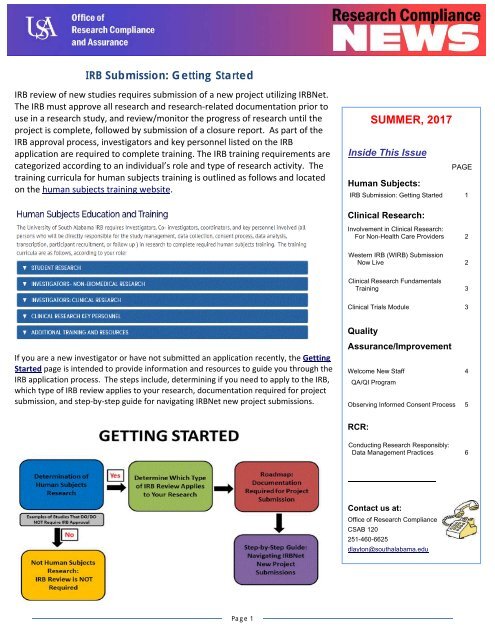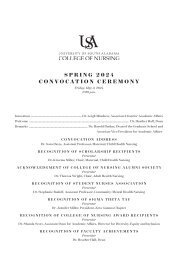compliancenews.summer2017
Create successful ePaper yourself
Turn your PDF publications into a flip-book with our unique Google optimized e-Paper software.
IRB Submission: Getting Started<br />
IRB review of new studies requires submission of a new project utilizing IRBNet.<br />
The IRB must approve all research and research‐related documentation prior to<br />
use in a research study, and review/monitor the progress of research until the<br />
project is complete, followed by submission of a closure report. As part of the<br />
IRB approval process, investigators and key personnel listed on the IRB<br />
application are required to complete training. The IRB training requirements are<br />
categorized according to an individual’s role and type of research activity. The<br />
training curricula for human subjects training is outlined as follows and located<br />
on the human subjects training website.<br />
SUMMER, 2017<br />
Inside This Issue<br />
PAGE<br />
Human Subjects:<br />
IRB Submission: Getting Started 1<br />
Clinical Research:<br />
Involvement in Clinical Research:<br />
For Non-Health Care Providers 2<br />
Western IRB (WIRB) Submission<br />
Now Live 2<br />
Clinical Research Fundamentals<br />
Training 3<br />
Clinical Trials Module 3<br />
Quality<br />
If you are a new investigator or have not submitted an application recently, the Getting<br />
Started page is intended to provide information and resources to guide you through the<br />
IRB application process. The steps include, determining if you need to apply to the IRB,<br />
which type of IRB review applies to your research, documentation required for project<br />
submission, and step‐by‐step guide for navigating IRBNet new project submissions.<br />
Assurance/Improvement<br />
Welcome New Staff 4<br />
QA/QI Program<br />
Observing Informed Consent Process 5<br />
RCR:<br />
Conducting Research Responsibly:<br />
Data Management Practices 6<br />
Contact us at:<br />
Office of Research Compliance<br />
CSAB 120<br />
251-460-6625<br />
dlayton@southalabama.edu<br />
Page 1
USA POLICY ON INVOLVEMENT IN CLINICAL RESEARCH <br />
FOR NON-HEALTH CARE PROVIDERS <br />
PURPOSE: The University encourages and supports clinical research led by Principal Investigators who are not primary health<br />
care providers (e.g. basic scientists) and also the involvement of non‐health care providers in clinical trials. This document<br />
clarifies the role and restrictions for basic scientists and other non‐primary health care providers involved in clinical research.<br />
NIH Definitions of Clinical Research and Clinical Trials<br />
“Clinical research is research that directly involves a particular person or group of people or that uses materials from humans,<br />
such as their behavior or samples of their tissue.<br />
A clinical trial is one type of clinical research that follows a pre‐defined plan or protocol. By taking part in clinical trials,<br />
participants can not only play a more active role in their own health care, but they can also access new treatments and help<br />
others by contributing to medical research.”<br />
This policy provides provisions for the following research activities involving clinical research and involvement of non‐health<br />
care providers:<br />
<br />
<br />
<br />
<br />
Training and Standards<br />
Maintaining Separation between Clinical and Basic Research Components<br />
Handling of Biological Specimens<br />
Management of Intellectual Property<br />
The policy may be accessed here and is located on the human subject’s website, policies & procedures page.<br />
Western IRB (WIRB) Submission is Now Live<br />
University of South Alabama has established a new agreement with WIRB Copernicus Group authorizing the Western<br />
Institutional Review Board (WIRB) to review and approve selective* industry sponsored multi‐center clinical trials.<br />
Participation in the use of a centralized IRB review process will aid in the efficiency of IRB review, as well as offering business<br />
applications and resources to enhance and support the clinical research enterprise. WIRB Copernicus consists of 8 individual<br />
accredited panels and 60 plus years of combined experience in protocol and study‐related review. The University will be<br />
provided the opportunity to connect to leading industry sponsored and CROs to expand our repertoire of industry sponsored<br />
clinical trials.<br />
* Eligibility for WIRB submission is defined by selective criteria. NOTE: Studies which involve any of the following are NOT<br />
eligible for WIRB review: Phase I Studies (including I/II, studies), planned emergency research, single patient emergency use<br />
or compassionate use situations, embryonic stem cell or gene therapy research, federally funded protocols, investigatorinitiated<br />
research, and research involving prisoners.<br />
Visit the new WIRB Submission web page to learn about the process, located on the Office of Research Compliance &<br />
Assurance website.<br />
Page 2
CLINICAL RESEARCH FUNDAMENTALS TRAINING <br />
A new training program was developed with efforts to engage in topics on fundamentals in clinical research and<br />
related institutional practices. The program is geared to clinical research coordinators, research nurses, regulatory<br />
specialists and other trial personnel. The 2017 program included 15 presentations spanning a two month period in<br />
May/June. The sessions were divided into four half day morning sessions and provided continuing education<br />
credits. The Office of Research Compliance and Assurance expresses many thanks to the individuals who<br />
participated in this program to help make it a success. This program will continue to evolve each year as we build<br />
upon training opportunities offered for clinical trial staff.<br />
Program Presenters:<br />
<br />
<br />
<br />
<br />
<br />
<br />
<br />
<br />
<br />
<br />
<br />
<br />
<br />
<br />
Cathy Blache, RN, MSN, CCRC, RNFA, Precision Clinical Research, LLC<br />
Karen Fagan, M.D., Professor, Medicine & Pharmacology, and Chief, Division of Pulmonary and Critical Care Medicine<br />
Allie Howell, Association Clinical Research Professionals (ACRP)<br />
Linda Hudson, Chief HIPAA Compliance Officer<br />
Hamayun Imran, M.D., IRB Chair, and Medical Director, Pediatric Hematology/Oncology<br />
Dusty Layton, MPA, BS, Executive Director, Office of Research Compliance and Assurance<br />
Spencer Liles, M.D., Assistant Professor, Division of Oncologic Surgery, MCI, Director, Mitchell Cancer Institute Biobank<br />
Edward Panacek, M.D., MPH, Professor and Chair, Emergency Medicine<br />
Thad Phillips, Asst. Chief HIPAA Compliance Officer‐HIPAA Security<br />
Priscilla Smith, Director, Revenue Integrity & Revenue Cycle Integrity – USAMC<br />
Paul Taylor, Director, College of Medicine Marketing & Communications<br />
Ashley Turberville, Director, Health Systems Grants Administration and Development<br />
Theresa Wright, RN, DNP, CCRC, Vice‐Chair and Associate Professor, Adult Health Nursing<br />
Western IRB (WIRB) Copernicus Group<br />
Training events for clinical research staff will continue to evolve and offering of new educational opportunities.<br />
Additionally, the Office of Research Compliance is developing an in‐house educational training program for clinical<br />
research physicians. We look forward to working with our clinical research sites in the development of new programs.<br />
Page 3
ANNOUCING NEW CLINICAL TRIALS<br />
MODULE<br />
The Office of Research Compliance and Assurance<br />
would like to thank Paul Taylor, Director,<br />
Marketing/Communications, College of Medicine for<br />
the acquisition of a clinical trials module for reporting<br />
active USA IRB clinical trials. The module is<br />
accessible from the USA Health Systems website.<br />
The IRB Office has added integrated posting active<br />
clinical trials as part of the IRB workflow process.<br />
REMINDER: <br />
Research Application Forms <br />
Please make sure you access IRBNet<br />
Forms/Templates to obtain the most up-todate<br />
protocol application related materials.<br />
We do not encourage saving template<br />
forms on your computer’s desktop, rather<br />
the document(s) should be obtained via<br />
IRBNet, when needed.<br />
QUALITY ASSURANCE & IMPROVEMENT PROGRAM <br />
WELCOME STEFANIE WHITE <br />
NEW MEMBER TO OUR STAFF <br />
The Office of Research Compliance and Assurance welcomes Stefanie White to our research compliance<br />
team. Stefanie will serve in the position as Associate Director, Research Quality Assurance and<br />
Improvement to strengthen research compliance oversight. Emphasis will be placed on development<br />
and implementation of continuous quality improvement, as well as performance enhancement<br />
initiatives.<br />
The purpose of a quality assurance and improvement program is to heighten awareness of regulatory<br />
requirements and improve the ethical conduct of research. The QA/QI program will aid the Office of<br />
Research Compliance & Assurance in evaluation of our programs effectiveness, post approval<br />
monitoring, identify issues to be addressed for educational training, and evaluation of informed consent<br />
process to assess if standards have been met and can be improved upon.<br />
Specifically, to facilitate compliance of human subject’s research, the QA/QI program will also provide<br />
services to assist researchers at the time of study start‐up regarding appropriate study management<br />
documents, assist with PI‐initiated studies, organize orientation for new study coordinators, and<br />
external audit preparation, for example.<br />
Page 4
Quality Assurance and Improvement Activities:<br />
Observation of the Consent Process<br />
The Quality Assurance and Improvement program aims to promote a culture of compliance and ethical standards<br />
in the conduct of research.<br />
The IRB has the authority to observe the consent process for ongoing studies as part of its quality assurance and<br />
quality improvement activities. The following are examples of information that will assessed when observing the<br />
consent process:<br />
<br />
<br />
<br />
<br />
Whether the subject appeared to understand the information and voluntary consented to participation<br />
Whether the information conveyed was accurate and in understandable language<br />
Whether the participant was allowed sufficient time to consider participation<br />
Whether the process of consent was appropriately completed and documented<br />
This process will support the study teams by offering a holistic viewpoint to study procedures. Feedback from this<br />
process can potentially aid in study recruitment.<br />
More information regarding this process, including a FAQ, can be obtained by contacting Stefanie White at 460‐<br />
7573 or swhite@southalabama.edu.<br />
UPCOMING TRAINING EVENTS<br />
2017‐2018 Responsible Conduct of Research (RCR) Training Series<br />
A new institutional training program will be offered to promote the responsible<br />
conduct of research. RCR not only applies to specific types of research activities,<br />
but also on topics related to the proper conduct of research and general<br />
awareness.<br />
The training program will launch in October as a series of eight monthly sessions. <br />
Program details will be forthcoming. <br />
Page 5
Conducting Research Responsibly: Data Management Practices<br />
Managing research data is a fundamental component of conducting research responsibly. It is the<br />
process of controlling information generated throughout the life cycle of a research project. This<br />
includes the acquisition, management, access, storage, and preservation of the data. The University’s<br />
data management policy defines “data” to mean recorded factual material commonly accepted as<br />
necessary to validate research findings. Research Data covers a broad range of types of information.<br />
Digital Data can be structured in a variety of formats. Data differs amongst disciplines and can include<br />
but is not limited to: documents, notebooks, Laboratory Notebooks, audiotapes, transcripts,<br />
photographs, test responses, slides, and algorithms. In practice, Research Data include intangible<br />
(statistics, findings, conclusions, etc.), as well as tangible Data.<br />
Research laboratories should carefully consider best practices and procedures for the proper recording<br />
and storing of research data.<br />
The University has several best practice documents and policy on data management and lab notebook<br />
ownership. These documents include:<br />
Data Management and Laboratory Ownership Policy<br />
Laboratory Notebooks: Best Principles and Standards<br />
Data Management Best Practices Written Agreement on Disposition of Research Data/Lab<br />
Notebook<br />
Written Agreement on Disposition or Research Data and/or Lab Notebooks<br />
The above documents are accessible via the Office of Research Compliance website under Responsible<br />
Conduct of Research: Standards & Resources<br />
Page 6
Have a Question or a Comment?<br />
Dusty Layton<br />
Angela Williams<br />
Executive Director<br />
Assistant Director<br />
460-6625 460-6509<br />
dlayton@southalabama.edu aswilliams@southalabama.edu<br />
Stefanie White<br />
Associate Director, Research Quality Assurance & Improvement<br />
460-7573<br />
swhite@southalabama.edu<br />
Point of Contact for Protocol Information:<br />
Human Subjects Research<br />
Animal Care & Use and Biosafety<br />
SuzAnne Robbins<br />
Jennifer Chaplin<br />
IRB Compliance Specialist<br />
Research Compliance Coordinator<br />
460-6308 460-6863<br />
irb@usouthal.eu<br />
jchaplin@southalabama.edu<br />
Page 7

















